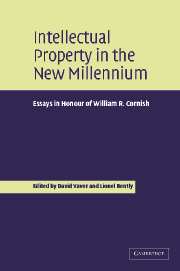Book contents
- Frontmatter
- Contents
- List of contributors
- Foreword
- Preface
- General intellectual property
- Patents and plant protection
- Trade marks and unfair competition
- 11 Dilution of a trade mark: European and United States law compared
- 12 Unfair competition: is it time for European harmonization?
- 13 Coexistence between the tort of passing off and freedom of slavish imitation in Polish unfair competition law
- 14 Confidentiality, patents and restraint of trade
- Copyright, moral and neighbouring rights
- William R. Cornish – curriculum vitae
- Index
13 - Coexistence between the tort of passing off and freedom of slavish imitation in Polish unfair competition law
Published online by Cambridge University Press: 25 May 2010
- Frontmatter
- Contents
- List of contributors
- Foreword
- Preface
- General intellectual property
- Patents and plant protection
- Trade marks and unfair competition
- 11 Dilution of a trade mark: European and United States law compared
- 12 Unfair competition: is it time for European harmonization?
- 13 Coexistence between the tort of passing off and freedom of slavish imitation in Polish unfair competition law
- 14 Confidentiality, patents and restraint of trade
- Copyright, moral and neighbouring rights
- William R. Cornish – curriculum vitae
- Index
Summary
William Cornish is one of the preeminent legal authorities of our time in the field of intellectual property. Those of us who have had the privilege of working with Bill know his independence, his openness to new ideas, and his ability to write clearly and persuasively.
I have had the pleasure to collaborate with Bill in two distinct capacities: in the late 1960s, he was my tutor at the London School of Economics when I was a British Council graduate student; in the early 1990s, we both served as members of the Board of Overseers and the Scientific Council of the Max Planck Institute in Munich, the ‘Mecca’ of Intellectual Property legal research.
Professor Cornish belongs among those great scholars who have always remained independent and served as advocates of the public interest. At a time of unprecedented pressures for greater protection of the intellectual property right and its ‘Europeanization’, he has remained aware of the risk of overprotection and stifling of competition as a result of granting too much protection to investors in the field of industrial property and copyright laws.
Introduction
My article deals with the issues at the borderline between misappropriation of a competitor's three-dimensional products (designs) and freedom of imitation in Polish law.
In many EU countries, in particular Germany and France, protection against the direct imitation of products has been granted under the general notion of the tort of unfair competition.
- Type
- Chapter
- Information
- Intellectual Property in the New MillenniumEssays in Honour of William R. Cornish, pp. 189 - 201Publisher: Cambridge University PressPrint publication year: 2004



